

Our Universities: The Outrageous Reality by Andrew Delbanco. Degrees of Inequality: How the Politics of Higher Education Sabotaged the American Dream by Suzanne Mettler Basic Books, 261 pp., $27.99 The Student Loan Mess: How Good Intentions Created a Trillion-Dollar Problem by Joel Best and Eric Best University of California Press, 233 pp., $26.95 Financing American Higher Education in the Era of Globalization by William Zumeta, David W.

Harvard Education Press, 255 pp., $29.95 (paper) Locus of Authority: The Evolution of Faculty Roles in the Governance of Higher Education by William G. Ithaka/Princeton University Press, 380 pp., $29.95 Paying for the Party: How College Maintains Inequality by Elizabeth A. Harvard University Press, 326 pp., $35.00 Aspiring Adults Adrift: Tentative Transitions of College Graduates by Richard Arum and Josipa Roksa University of Chicago Press, 246 pp., $18.00 (paper) How that part has grown is a stirring story. In the twentieth century the pace quickened. Today this story is stalled. What is to be done? This is often true. Secrets of amazing teachers: What both sides of the education reform debate get wrong about autonomy and accountability. The common view of great teachers is that they are born that way.
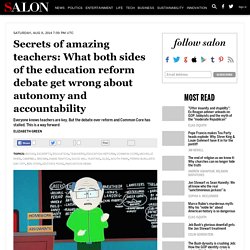
Like Michelle Pfeiffer’s ex-marine in “Dangerous Minds,” Edward James Olmos’s Jaime Escalante in “Stand and Deliver,” and Robin Williams’s “carpe diem”–intoning whistler in “Dead Poets Society,” legendary teachers transform thugs into scholars, illiterates into geniuses, and slackers into bards through brute charisma. Teaching is their calling—not a matter of craft and training, but alchemical inspiration.
Bad teachers, conversely, are portrayed as deliberately sadistic (as with the Sue Sylvester character on “Glee”), congenitally boring (Ben Stein’s nasal droner in “Ferris Bueller’s Day Off”), or ludicrously dim-witted (Mr. Garrison from “South Park”). These are the tropes of a common narrative, a story I’ve come to call the “Myth of the Natural-Born Teacher.” Even in the rare cases where fictional teachers appear to improve—as happens in “Goodbye, Mr. Before I met Magdalene Lampert, I ascribed to this view as well.
Okay. Why Children Need Chores. The Null Professor. This is a post about CS education.
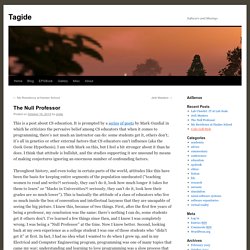
It is prompted by a series of posts by Mark Guzdial in which he criticizes the pervasive belief among CS educators that when it comes to programming, there’s not much an instructor can do: some students get it, others don’t; it’s all in genetics or other external factors that CS educators can’t influence (aka the Geek Gene Hypothesis). I am with Mark on this, but I feel a bit stronger about it than he does. I think that attitude is bullshit, and the studies supporting it are unsound by means of making conjectures ignoring an enormous number of confounding factors. Throughout history, and even today in certain parts of the world, attitudes like this have been the basis for keeping entire segments of the population uneducated (“teaching women to read and write?!
Seriously, they can’t do it, look how much longer it takes for them to learn” or “blacks in Universities?! Let me expand on these two points. The Null Professor Graham is absolutely right. Genetics. The Math Ceiling: Where’s your cognitive breaking point? One afternoon, the head of my department caught me in the staff room and posed a musing question.

(He later confessed that he was just curious if he could play puppet-master with this blog. The answer is a resounding yes: I dance like the puppet I am.) So, do we have ceilings? The revolution that’s changing the way your child is taught. The video does not seem remarkable on first viewing.

A title informs us that we are watching Ashley Hinton, a teacher at Vailsburg Elementary, a school in Newark, New Jersey. Hinton, a blonde woman in a colourful silk scarf, stands before a class of eight- and nine-year-old boys and girls, almost all of whom are African-American. “What might a character be feeling in a story?” She asks. How ‘Deprogramming’ Kids From How to ‘Do School’ Could Improve Learning. iStock One day, Adam Holman decided he was fed up with trying to cram knowledge into the brains of the high school students he taught.
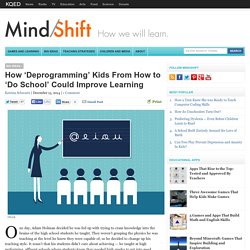
They weren’t grasping the physics he was teaching at the level he knew they were capable of, so he decided to change up his teaching style. It wasn’t that his students didn’t care about achieving — he taught at high performing, affluent schools where students knew they needed high grades to get into good colleges. Private colleges are a waste of money for white, middle class kids.
These students attend the University of Maryland in College Park.

They were smart. (Sarah L. Voisin/The Washington Post) Why I hate (and love) visualizations of mathematics. I have a love-hate relationship with visualizations of mathematical ideas.
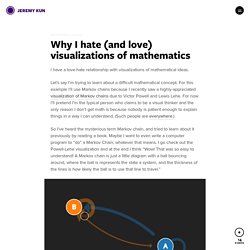
Let’s say I’m trying to learn about a difficult mathematical concept. For this example I’ll use Markov chains because I recently saw a highly-appreciated visualization of Markov chains due to Victor Powell and Lewis Lehe. For now I’ll pretend I’m the typical person who claims to be a visual thinker and the only reason I don’t get math is because nobody is patient enough to explain things in a way I can understand. (Such people are everywhere.) So I’ve heard the mysterious term Markov chain, and tried to learn about it previously by reading a book. High-achieving teacher sues state over evaluation labeling her ‘ineffective’ Sheri G.
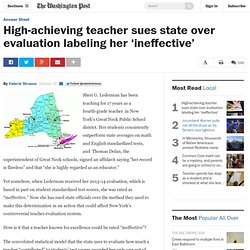
Lederman has been teaching for 17 years as a fourth-grade teacher in New York’s Great Neck Public School district. Her students consistently outperform state averages on math and English standardized tests, and Thomas Dolan, the superintendent of Great Neck schools, signed an affidavit saying “her record is flawless” and that “she is highly regarded as an educator.” Yet somehow, when Lederman received her 2013-14 evaluation, which is based in part on student standardized test scores, she was rated as “ineffective.” Now she has sued state officials over the method they used to make this determination in an action that could affect New York’s controversial teacher evaluation system. How is it that a teacher known for excellence could be rated “ineffective”? Teacher spends two days as a student and is shocked at what she learns.
A student takes notes at Woodrow Wilson High School in Washington D.C.
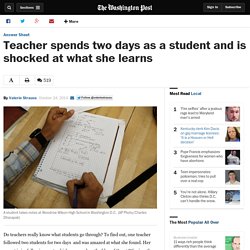
(AP Photo/Charles Dharapak) Do teachers really know what students go through? To find out, one teacher followed two students for two days and was amazed at what she found. Her report is in following post, which appeared on the blog of Grant Wiggins, the co-author of “Understanding by Design” and the author of “Educative Assessment” and numerous articles on education. A high school teacher for 14 years, he is now the president of Authentic Education, in Hopewell, New Jersey, which provides professional development and other services to schools aimed at improving student learning.
Published for the First Time: a 1959 Essay by Isaac Asimov on Creativity. Note from Arthur Obermayer, friend of the author: In 1959, I worked as a scientist at Allied Research Associates in Boston. The company was an MIT spinoff that originally focused on the effects of nuclear weapons on aircraft structures. The anarchic experimental schools of the 1970s.
Image copyright Gerry Fletcher In the 1970s, idealistic young activists created a wave of experimental schools - no compulsory lessons, no timetables, no rules. So what happened to the kids who attended these free-for-alls? You wait an age for the green man to let you cross Liverpool's Scotland Road. It goes back to 1971. American Schools Are Training Kids for a World That Doesn't Exist. Are Americans getting dumber? Our math skills are falling. Our reading skills are weakening. The Future of College? How I Rewired My Brain to Become Fluent in Math - Issue 17: Big Bangs. I was a wayward kid who grew up on the literary side of life, treating math and science as if they were pustules from the plague. So it’s a little strange how I’ve ended up now—someone who dances daily with triple integrals, Fourier transforms, and that crown jewel of mathematics, Euler’s equation.
It’s hard to believe I’ve flipped from a virtually congenital math-phobe to a professor of engineering. One day, one of my students asked me how I did it—how I changed my brain. I wanted to answer Hell—with lots of difficulty! After all, I’d flunked my way through elementary, middle, and high school math and science. Why don’t more men go into teaching? Fear of The Accusation. In the NYT Motoko Rich asks “Why Don’t More Men Go Into Teaching? “, and he gives a variety of answers but not an important one: any male teacher is only one accusation away from having his entire career derailed and a potentially lengthy, onerous police investigation. I thought about going into teaching, but stories from existing male teachers were persuasively dissuading. At the K-12 level, you’ve got all the problems that all teachers face—obnoxious “do something” administrators, angry parents, medium- to low-status, etc.
—plus the need to teach defensively and to think about how any words or actions can be interpreted in the worst light possible. Unschooling: The Case for Setting Your Kids Into the Wild. Alyxandria. Teach Talk: A Contrarian View of MITx: What Are We Doing!? Most Math Problems Do Not Have a Unique Right Answer. I Can't Afford a Bachelor's Degree, So I'm Making My Own. The Teaching Class by Rachel Riederer. [1405.1429] How Community Feedback Shapes User Behavior. The Unreasonable Effectiveness of Checklists. Study: You Really Can 'Work Smarter, Not Harder' - Nanette Fondas. The trouble with Khan Academy - Casting Out Nines. Jeremy Kun. How To Think. Learning, powered by imagination. - Memrise. Standardized testing: I opted my kids out. The schools freaked out. Now I know why. Lockhart's Lament - The Sequel. Hackschooling makes me happy: Logan LaPlante at TEDxUniversityofNevada.
Sir Ken Robinson: Do schools kill creativity? Edward Frenkel on Love and Math: What is it like to be a mathematician? FutureLearn Launches Free Online University Courses. Anki Decks. Anki - powerful, intelligent flashcards.